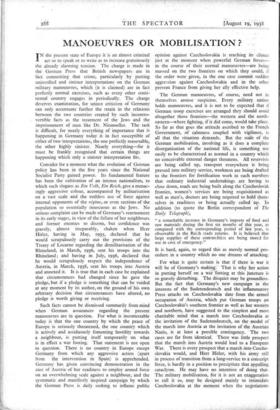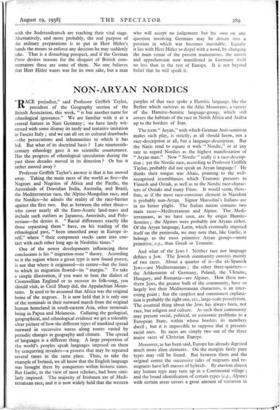MANOEUVRES OR MOBILISATION ?
TN the present state of Europe it is an almost criminal -1- act so to speak or to write as to increase gratuitously the already alarming tension. The charge is made in the German Press that British newspapers are in fact committing that crime, particularly by putting unjustified and sinister interpretations on the German military manoeuvres, which (it is claimed) are in fact perfectly normal exercises, such as every other conti- nental country engages in periodically. The charge deserves examination, for unjust criticism of Germany can only accentuate further the strain in the relations between the two countries created by such incontro- vertible facts as the treatment of the Jews and the imprisonment of men like Dr. Niemoeller. The task is difficult, for nearly everything of importance that is happening in Germany today is in fact susceptible of either of two interpretations, the one prefecdy reasonable, the other highly sinister. Nearly everything—for it must be frankly recognised that certain things are happening which only a sinister interpretation fits.
Consider for a moment what the evolution of German policy has been in the five years since the National Socialist Party gained power. Its fundamental feature has been the cultivation of an intense nationalism, to which such slogans as Ein Volk, Ein Reich, give a menac- ingly aggressive colour, accompanied by militarisation on a vast scale and the ruthless use of force against internal opponents of the regime, or even sections of the population so essentially innocuous as the Jews. No serious complaint can be made of Germany's rearmament in its early stages, in view of the failure of her neighbours and former enemies to disarm, but confidence was gravely, almost irreparably, shaken when Herr Hitler, having in May, 1935, declared that he would scrupulously carry- out the provisions of the Treaty of Locarno regarding the demilitarisation of the Rhineland, in March, 1936, sent his troops into the Rhineland; and having in July, 1936, declared that he would scrupulously respect the independence of Austria, in March, 1938, sent his troops into Austria and annexed it. It is true that in each case he explained that circumstances had changed since he gave the pledge, but if a pledge is something that can be voided at any moment by its author, on the ground of his own arbitrary decision that circumstances have altered; no pledge is worth giving or receiving.
Such facts cannot be dismissed summarily from mind when German assurances . regarding the present manoeuvres are in question. For what is incontestable today is that the one country by which the peace of Europe is seriously threatened, the one country which is actively and assiduously fomenting hostility towards a neighbour, is putting itself temporarily on what is in effect a war footing. That statement is not open to question. There is no country in. Europe except Germany from which any aggressive action (apart from the intervention in Spain) is apprehended. Germany has given convincing demonstration in the case of Austria of her readiness to employ armed force on an overwhelming scale against a neighbour, and the systematic and manifestly inspired campaign by which the German Press is daily seeking to inflame public opinion against Czechoslovakia is reaching its climax just at the moment when powerful German forces--; in the course of their normal manoeuvres—are being massed on the two frontiers on which they could; if the order were tiven, in the one case commit sudden aggre3sion against Czechoslovakia and in the other prevent France from giving her ally effective help.
The German manoeuvres, of course, need not in themselves arouse suspicion. Every .military nation holds manoeuvres, and 'it is not to be expected that if German troop exercises are arranged they should avoid altogether those frontiers—the western and the north- eastern—where fighting, if it did come, would take place. So far as that goes the attitude aseribed to. the French Government, of calmness coupled with yigilance, is all that the situation demands. But the scale 'of the German mobilisation, involving as it does a complete disorganisation of the national life, is something not easily to be characterised as normal in a country which no conceivable external danger threatens. All reservists are being called up, transport eyeryWhere is being pressed into military service, workmen are being drafted to the frontiers for fortification work in such numbers that ordinary induStrial undertakings are having to close down, roads are. being built along the Czechosloiak frontier, women's , services are being requisitioned as Well as men's, doctors are being required to hOlcI them- selves in readiness or being actually called' Jip. In addition (to quote the Berlin, correspondent of The Daily Telegraph), " a remarkable increase in Germany's imports of food and raw materials during the first six months of this year, as compared with the corresponding period of laSt year, is observable in the Reich trade returns. It is believed that large supplies of these commodities are being stored for use in case- of emergency."
It is hard, again, to regard this as merely normal pro- cedure in a country which no one dreams of attacking.
For what is quite certain is that if there is war it Will be of Gerniany's making: - That is why her action in putting herself on a war 'foisting at this juncture is so gravely disturbing. The disquiet may be groundless. But the fact that Germany's new campaign in the interests of the Sudetendeutsch and the inflammatory Press attacks on Czechoslovakia date from the armed occupation of Austria, which put German troops on Czechoslovakia's southern frontier as well as her western and northern, have suggested to the simplest and most charitable mind that a march into CzechoslaVakia at the invitation of the SudetendeutsCh, on the 'model of the march into Austria at the invitation of the Austrian Nazis, is' at least a possible contingency. ' The two cases are far from identical. There was little prospect that the march into Austria would lead to a European War. There is every prospect that a march into Czecho- slovakia would, and Herr Hitler; with his army still in process of transition from a' long-Service to a conscript force, is hardly in a- position to preCipitate that appalling cataclysm. He may have no intention of doing that. The military mobilisation, for it is not an exaggeratidn to call it so, may be designed mainly to intimidate Czechoslovakia at the moment when the negotiations with the Sudetendeutsch are reaching their vital stage. Alternatively, and more probably, the real purpose of the military preparations is to put in Herr Hitler's hands the means to enforce any decision he may suddenly take. That is a disturbing prospect, and if the German Press desires reasons for the disquiet of British com- mentators these are some of them. No one believes that Herr Hitler wants war for its own sake, but a man who will accept no judgement but his own on any question involving Germans may be driven into a position in which war becomes inevitable. Equally it lies with Herr Hitler to dispel with a word, by changing the main venue of the present manoeuvres, the unrest and apprehension now manifested in Germany itself no less than in the rest of Europe. It is not beyond belief that he will speak it.







































 Previous page
Previous page